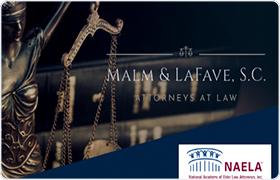South Milwaukee Estate Lawyer, Wisconsin
Sponsored Law Firm
-
 x
x

Click For More Info:
-
Malm & LaFave S.C.
7177 N Port Washington Rd Suite 210 Milwaukee, WI 53217» view mapEstate Law Comprehensive & Personalized
Malm & LaFave considers the needs of its clients to be a priority, and we will meet with you when it best fits your schedule.
800-984-4710
Thomas K. Hackbart
International, Wills & Probate, Estate Planning, Guardianships & Conservatorships
Status: In Good Standing Licensed: 47 Years
John A. Zodrow
Estate, Residential Real Estate, Power of Attorney, Landlord-Tenant
Status: In Good Standing Licensed: 41 Years
Mark Richard Cummisford
Estate Administration, Residential Real Estate, Foreclosure, Contract, Child Support
Status: In Good Standing Licensed: 23 Years
Patricia M. Cavey
Estate Planning, Child Custody, Consumer Rights, Elder Law
Status: In Good Standing Licensed: 36 Years
 Thomas LaFave Milwaukee, WI
Thomas LaFave Milwaukee, WI Practice AreasExpertise
Practice AreasExpertise
